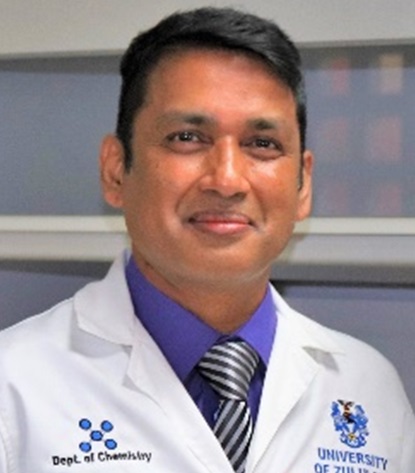
Position: Full Professor
Phone: 035 902 6155
Email: PullabhotlaV@unizulu.ac.za
Building &Room: 233 , Natural Science Building, KwaDlangezwa Campus
Biography:
Professor Pullabhotla is Full Professor in the Department of Chemistry. Prof. Pullabhotla has accumulated experience in field of chemistry by working in chemical industries, research institute (CSIR, India) and tertiary educational institutes.
Prof Pullabhotla is the principal investigator of the Catalysis Research Group at University of Zululand. Prof Pullabhotla has 2 registered Patents and has co-authored 66 publications and 3 monographs in peer reviewed journals. He has emerged as a C2 rated Scientist by National Research Foundation (NRF), South Africa. His research interests are mainly directed towards heterogeneous catalysis, oxidation reactions, wastewater research, bioflocculation and nanomaterials.
His academic activities foster analytical chemistry and his research is focused on the heterogeneous catalysis, petrochemicals, oxidation reactions, synthesis and characterization of various nanomaterials. Characterisation of materials using advanced techniques in the electron microscopy.
Prof Pullabhotla is also a NRF rated scientist. Currently he is working on various projects involving the ozone initiated catalytic oxidation of various saturated hydrocarbons using ozone and mesoporous and microporous catalyst systems. These projects aim at the conversion of the stubborn saturated hydrocarbons to value added products using the simple advanced oxidation route (AOPs) and moderate reaction conditions. His group aims to develop environmentally benign chemical processes by optimizing catalyst for oxidants. It is ideal to use an environmentally benign oxidant such as ozone, hydrogen peroxide, since oxidation reaction is the most important reaction that dominates over 30 % of all chemical processes.
He has more 15 years of academic work experience. Prof Pullabhotla gained 23 + years of academic, industrial and research experience.
Lecture’s the following modules:
Analytical Chemistry 2 (4CHM211/SCHM211)
Analytical Chemistry 3 (4CHM322/SCHM322) and
Advanced Analytical Chemistry (4CHM501).
Qualifications:
- BScHons (Andhra University, India)
- MSc (Eng) (JNT University, India)
- PhD (UKZN)
- PGDHE (UKZN)
Honours/Awards (include online reference for each honour/ award):
- Recipient of C2 Rating – NRF’s Emerged Researcher.
- Recipient of Support Grants (CSUR) from NRF
- Received the Competitive Grants (CPRR) from NRF
- Received the Incentive Grants for Rated Researcher from NRF
- Emerging researcher and Research Enthusiast award from University of Zululand for the year 2015.
- Emerging researcher and Research Productivity award from University of Zululand for the year 2014.
- Emerging researcher award from University of Zululand for the year 2013.
Professional membership:
- Member of Catalysis Society of South Africa (CATSA)
- Member of Royal Society Chemistry (RSC)
- Member of South African Chemical Society (SACI)
Research interests:
Areas of Research Interest:
- Heterogeneous Catalysis.
- Oxidation Chemistry.
- Nanoparticles and Metal-semiconductor Hybrid Nanostructure Synthesis and characterization.
- Wastewater treatment: Oxidative degradation and catalytic degradation of wastewater streams.
- Biosynthesis of Nanomaterial for the Wastewater treatment.
Past Research Projects:
- Biosynthesis of nickel, iron and silver nanoparticles using bioflocculants from Alcalegenis faecalis, characterization and its application.
- Catalytic oxidation of cyclohexane using metal supported catalysts and ozone.
- pH dependant catalytic oxidative degradation of m-cresol using ozone.
- Toxicity of Lead (Pb) and Cadmium (Cd) on Amaranthus thunbergii a Leafy Vegetable.
- Oxidation of o-cresol using various metal loaded metal oxide catalysts.
- Oxyfunctionalisation of 1,2-dichlorobenzene using Mn loaded catalysts.
- Biosynthesis of copper nanoparticles, characterization and its application as an antimicrobial and waste water treatment.
- Catalytic oxidation of cresols using molecular ozone.
- Oxidation of cyclohexane using ozone and supported metal oxide catalysts.
- Oxidation of 1,2-dichlorobenzene using ozone and supported metal oxide catalysts.
- Synthesis and shape control of functionalized BiE, SbE and SnE (E = Se, Te and S) nanoparticles.
- A simple single molecular precursor route in the synthesis and characterization of SnS (tin(II) sulphide) nanoparticles.
- Synthesis and characterization of BiE (E = Se, Te and S) nanoparticles using BiCl3 as a precursor.
- Synthesis of antimony-tetramethylthiourea complex as a single source precursor for the organic capped antimony sulphide nanoparticles.
- The investigation of metal complexes with pyrazolyl ligands in the synthesis of nanoparticles.
